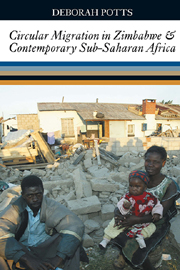Book contents
- Frontmatter
- Contents
- List of Maps, Figures, Tables, Boxes & Photographs
- List of Abbreviations
- Preface
- 1 Introduction
- 2 Regional Paradigms & Approaches to Circular Migration
- 3 Regional Paradigms & Approaches to Circular Migration
- 4 Harare & Zimbabwe
- 5 Migrant Livelihoods & Migration Trajectories in Harare
- 6 Harare Migrants' Rural Links & Assets
- 7 Variations in Migrants' Experience, Perceptions & Options
- 8 Social & CulturalAttachments to Rural Settings & Homes
- 9 Attacking the Urban Poor & Abusing Rural Links Operation Murambatsvina 2005
- 10 Conclusion
- Appendix: Consumer Price Index (all items) for Urban Families 1973–2007
- Bibliography
- Index
6 - Harare Migrants' Rural Links & Assets
Published online by Cambridge University Press: 05 July 2013
- Frontmatter
- Contents
- List of Maps, Figures, Tables, Boxes & Photographs
- List of Abbreviations
- Preface
- 1 Introduction
- 2 Regional Paradigms & Approaches to Circular Migration
- 3 Regional Paradigms & Approaches to Circular Migration
- 4 Harare & Zimbabwe
- 5 Migrant Livelihoods & Migration Trajectories in Harare
- 6 Harare Migrants' Rural Links & Assets
- 7 Variations in Migrants' Experience, Perceptions & Options
- 8 Social & CulturalAttachments to Rural Settings & Homes
- 9 Attacking the Urban Poor & Abusing Rural Links Operation Murambatsvina 2005
- 10 Conclusion
- Appendix: Consumer Price Index (all items) for Urban Families 1973–2007
- Bibliography
- Index
Summary
Rural assets are only one of a wide range of factors which influence livelihood options and outcomes in Zimbabwe's urban areas. Education levels play a major part. Ownership of urban property is enormously beneficial. Family socio-economic status is crucial. Each of these factors is in its turn influenced by broad structural conditions and events, and their temporal intersection with an individual's life cycle. For example, finishing school with a reasonable set of results when the economy is faring well self-evidently provides better livelihood prospects than job-seeking in an era of formal job retrenchment and increasingly saturated informal sector markets. Managing to obtain rights to a legal urban property can be a life-transforming event. Seeking to establish a separate urban residence, whether one is urban or rural born, is more likely to yield a safe home and possibly productive asset when at least some formal housing projects are active and/or informal housing is tolerated rather than when national and global conditions dictate that virtually nothing is affordable or secure. In Johannesburg, for example, it has been shown that households who secured their housing in the early decades of apartheid, when formal townships were being established en masse, are in a far better situation than later entrants to the African housing market (Beall et al. 2006).
- Type
- Chapter
- Information
- Publisher: Boydell & BrewerPrint publication year: 2010



